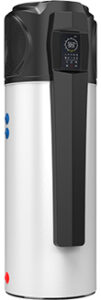
Are you looking for a hot water system that is energy efficient, cost-effective and environmentally friendly?
Look no further than hot water heat pumps!
As one of the most advanced hot water systems on the market, hot water heat pumps provide more than just hot showers. Learn how these innovative systems can save you money while improving your quality of life.
What Are Hot Water Heat Pumps And How Do They Work?

Heat pumps are an energy-efficient hot water system that uses electricity to transfer heat from one place to another.
They work similarly to an air conditioner, but in reverse – taking heat from the outside environment and transferring it into your hot water tank for use in showers, baths and other hot water appliances.
Heat pumps are highly efficient, using up to 70% less energy than traditional hot water systems such as gas or electric storage tanks. By using this technology, you can reduce your hot water bills significantly while also reducing your carbon footprint.
The Cost Savings Of Hot Water Heat Pumps
Comparison of heat pump hot water systems to traditional hot water systems (e.g. gas, electric)
To understand how heat pump systems are the most cost-saving solution for water heating, here’s a simple comparison of cost between gas, electric, and heat pump systems for a household of one person in Victoria who uses up to 50 litres per day.
|
System |
Type |
$ per year |
|
Gas |
Storage |
250 |
|
Electric |
Off-peak tariff |
290 |
|
Heat pump |
Off-peak tariff |
70 |
Data taken from sustainability.vic.gov.au
From the table above you can see a $220 difference between electric and heat pump systems which is about 75% in cost savings per year!
Potential for government rebates or incentives
In addition to this, the Australian Government offers eligible households a rebate worth up to $1000 for heat pump units that are registered with the Australian Government Clean Energy Regulator.
Other benefits of heat pump hot water systems
Aside from helping you save unnecessary expenditure in bills, heat pumps also have other really valuable benefits:
Environmentally-friendly
The International Energy Agency reports that heating in buildings is currently responsible for 4 gigatonnes (Gt) of CO2 emissions per year. That’s 10% of all global emissions caused by building heating systems alone. The use of heat pumps can reduce global CO2 emissions by half a gigatonne by 2030, making it the most climate-friendly option in the range of water heaters.
These environmental benefits apply to the air quality in your own home as well. Gas-powered water heaters are known to release both CO2 and NO2 emissions into the air within the home, creating the risk of various respiratory illnesses for those who live there. Whereas heat pump water heaters are combustion-free, so you can rest assured that your family is safe and healthy with cleaner air at home.
A Longer Lifespan And Low Maintenance.
Heating systems that are made with more individual parts naturally require a higher degree of maintenance effort and cost. Heat pumps have simpler designs compared to other heating systems which results in lower maintenance needs and a much longer lifespan (15 – 20 years).
Quieter Operation

Any water heater would generate some level of noise while running because noise is mostly created by the air and pressure flow within the system.
However, with the latest material and technology available, ultra-quiet modern heat pumps can have a sound level rating of about 18 – 30 decibels which is slightly less than the sound level of indoor air conditioners. A good technician should take time to inspect your home and advise on the best location for installing a heat pump so that it doesn’t interfere with your sleep or bother the neighbours.
Choosing And Installing A Heat Pump Hot Water System
Now that you have a good introduction to how a hot water heat pump works and what its many benefits are, here are some factors to consider when choosing a suitable system for your home.
Size
Heat pump systems come with various water storage sizes. The number of people in your home and the number of hot water devices you have will determine the appropriate size for your storage.
Bear in mind that a storage tank that is too small will often quickly run out of hot water. On the other hand, one that is too large for your household and lifestyle use will be costly because it continues to maintain the hot temperature of water even when the taps are switched off.
Energy Efficiency Rating
It’s a global standard practice for most electrical appliances to come with a star rating system for energy efficiency. However, at this point, energy efficiency performance requirements are not in place for heat pump water heaters. Nevertheless, speak to your heat pump provider to get a better understanding of exactly how your heat pump system has high energy efficiency.
Price And Warranty
There are several hot water heat pump brands available in Australia which can range between $2000 to $5000 and up. Naturally, a higher price might indicate more features or a more premium brand. Also, check on the warranty period of each heat pump. It’s important to consider all these factors and choose something suitable for your lifestyle and usage.
Steps Involved In The Installation Process
There are a few steps involved in the installation process so it’s best to consult a professional technician to manage it all.
In general, the process will include:
- Removing your old system
- Choosing the best location around the house for the new system
- Creating an access point in the wall for piping
- Install the unit and connect pipes, wiring, and electricity
- Safety checks
Bonus Tips for Maximising Savings: Short Connecting Pipes & Insulation

A final tip for making the most of your hot water heat pump system is to keep the length of your connecting pipes as short as possible so you can minimise heat loss. This is best done by installing your system as close to your designated water outlets as possible. Ie. Kitchen, bathroom, laundry room.
Also, ensure all pipes are insulated using closed-cell rubber to reduce heat loss. Finally, ensure that all plumbing and electrical work is carried out by a licensed professional. You can request a certificate of compliance to be safe.
Conclusion
It’s clear that hot water heat pumps help you save money, reduce energy usage and your carbon footprint – all while improving your home’s air quality and helping you get a good night’s sleep!
So, if it’s time to change your hot water system, don’t just replace it with the same low-tech system. Give your home the upgrade it deserves and get a hot water heat pump.
To learn more about the heat pump options available, contact our friendly Gaschill team here.
References
- https://services.gaschill.com.au/h15eat-pump-hot-water-installation/
- https://www.sustainability.vic.gov.au/energy-efficiency-and-reducing-emissions/save-energy-in-the-home/water-heating/choose-the-right-hot-water-system/heat-pump-water-heaters
- https://www.sustainability.vic.gov.au/energy-efficiency-and-reducing-emissions/save-energy-in-the-home/water-heating/calculate-water-heating-running-costs
- https://www.energy.gov.au/rebates/solar-and-heat-pump-hot-water-system-rebate
- https://www.iea.org/reports/the-future-of-heat-pumps/executive-summary
- https://www.energyrating.gov.au/products/water-heaters
- https://www.linquip.com/blog/installing-an-air-source-heat-pump/#The_installation
- https://www.sustainability.vic.gov.au/energy-efficiency-and-reducing-emissions/save-energy-in-the-home/water-heating/hot-water-installation-tips


